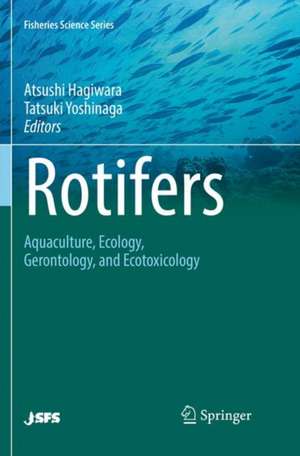Rotifers: Aquaculture, Ecology, Gerontology, and Ecotoxicology: Fisheries Science Series
Editat de Atsushi Hagiwara, Tatsuki Yoshinagaen Limba Engleză Paperback – 12 dec 2018
linked, and provide readers with comprehensive information on how rotifers are now being employed in biological investigations.
| Toate formatele și edițiile | Preț | Express |
|---|---|---|
| Paperback (1) | 825.92 lei 38-44 zile | |
| Springer Nature Singapore – 12 dec 2018 | 825.92 lei 38-44 zile | |
| Hardback (1) | 837.64 lei 38-44 zile | |
| Springer Nature Singapore – 15 dec 2017 | 837.64 lei 38-44 zile |
Preț: 825.92 lei
Preț vechi: 1086.74 lei
-24% Nou
Puncte Express: 1239
Preț estimativ în valută:
158.04€ • 165.45$ • 130.77£
158.04€ • 165.45$ • 130.77£
Carte tipărită la comandă
Livrare economică 02-08 aprilie
Preluare comenzi: 021 569.72.76
Specificații
ISBN-13: 9789811354496
ISBN-10: 9811354499
Pagini: 180
Ilustrații: XIV, 180 p. 27 illus., 12 illus. in color.
Dimensiuni: 155 x 235 mm
Ediția:Softcover reprint of the original 1st ed. 2017
Editura: Springer Nature Singapore
Colecția Springer
Seria Fisheries Science Series
Locul publicării:Singapore, Singapore
ISBN-10: 9811354499
Pagini: 180
Ilustrații: XIV, 180 p. 27 illus., 12 illus. in color.
Dimensiuni: 155 x 235 mm
Ediția:Softcover reprint of the original 1st ed. 2017
Editura: Springer Nature Singapore
Colecția Springer
Seria Fisheries Science Series
Locul publicării:Singapore, Singapore
Cuprins
Chapter 1. Taxonomy 1-1. Current status of morphological classification in aquaculture strains (Kotani, Hagiwara)1-2. Speciation and evolution of Brachionus (Snell, Serra, Fontaneto) Chapter 2.- Live food 2-1. Mass culture and preservation of Brachionus (Koiso, Kuwata, Hagiwara) 2-2. Enrichment of rotifers and its effect on the growth and survival of fish larvae (Kotani) 2-3. Utility of rotifers on the larval rearing of marine fishes cultivated under various conditions (Sakakura) 2-4.Other potential rotifer species as a live food (Ogata, Kurokura, Hagiwara) Chapter 3.- Model organism 3-1. Life history evolution in the rotifer (Stelzer) 3-2.Population dynamics in the rotifer (Yoshinaga) 3-3. Aging and lifespan in the rotifer (Kaneko) 3-4. Origin of sex: significance of sexual reproduction (Welch) 3-5. Ecological diagnosis (Suga, Snell) 3-6. Genomics (Suga, Welch, Lee).
Recenzii
“Since the introduction of the rotifer Brachionus plicatilis to marine-fish-fry production in Japan, significant advances have been made in the technologies aimed at blood selection, mass culture and preservation, and these have subsequently promoted international academic exchanges with the editors of this book: Part I covers advanced taxonomy and genetics; Part II discusses the principles of mass-culture methods and the use of newly discovered and native rotifers. Part III, then examines rotifers’ merits as model organisms in ecotoxicology.” (translated from Japanese, Prof. Akinori Hino, Nippon Suisan Gakkaishi, Vol. 84 (3))
Notă biografică
Editors
Atsushi Hagiwara
PhD, Professor, Graduate School of Fisheries and Environmental Sciences, Nagasaki University
Tatsuki Yoshinaga
PhD, Associate Professor
School of Marine Biosciences, Kitasato University
Textul de pe ultima copertă
This book highlights the latest advances in rotifer studies in various fields including aquaculture, ecology, gerontology and ecotoxicology. The genus Brachionus are an indispensable type of zooplankton, having served as an initial live food for marine larval rearing since the 1960s. Their mass culture techniques have been intensively studied, and some essential achievements have been made – regarding high density culture, employment of valuable dietary algae, automated culture systems, and effective production of resting eggs. These have in turn supported stable and efficient aquatic seedling production for numerous important marine fish species including flounder, sea bream, and bluefin tuna. Further, this group is considered to be a suitable model for studying various aspects in ecology. A series of aquaculture and basic science studies have significantly advanced our understanding of the life history evolution. The studies in these two fields are closely linked, and provide readers with comprehensive information on how rotifers are now being employed in biological investigations.
Caracteristici
A modern reference guide to both aquaculture and basic science aspects of Brachionus, from taxonomy to genomics The first English-language book that provides extensive information on the mass culture techniques that have previously been reported on only in Japanese Provides typical examples of fisheries science studies in Japan with a blend of basics and applications, offering international readers valuable insights into why Japan has assumed a pioneering role in live food technology




